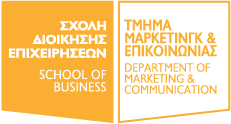Research Areas
Business-to-Business Marketing studies the function of Marketing in industrial markets, i.e. in transactions among businesses and organizations, and derives its specificities from the nature of the buyer and the seller, who are professionals and not private citizens. Examples of studies: the basic differentiations among business and consumer markets, the research and segmentation of industrial markets, etc.
Advertising and Marketing Communication
Advertising comprises a basic communication tool for marketing. The reinforcement of awareness, the creation of positive attitude, the formation of image, and the promotion of testing, buying and repurchasing a product or service, constitute some of the objectives it serves. The factors and the processes that determine the effectiveness of an advertising message constitute a central research topic.
International Marketing focuses on confronting the challenges and exploiting the opportunities that a globalized market creates for a firm. The international business environment, market research at an international level, the obstacles and ways of entering international markets, international strategic alliances, the standardization / adjustment of brand management, pricing, distribution and communication, are some examples of research topics.
International and Comparative Human Resources Management
Human Resources Management at a European and international level examines the implementation of HRM practices in an international context. It deals with the comparison of different HRM implementation models in different geographic regions.
Distribution Networks and Logistics
Distribution is one of the four elements of the marketing mix. It focuses on decisions regarding the organization and management of the distribution networks and supplies of a firm. Indicative research topics are the design and structure of a network, the forms of co-operations and conflicts among network members, inventory management and the transfer and storage of commodities.
Change Management examines the processes that relate to the implementation of organizational changes in businesses and firms, aiming at supporting the successful transition from a present to a desired situation. It is based on theories and models stemming from strategy, organizational behavior and psychology, human resources management and leadership.
Human Resources Management is concerned with topics such as strategic human resources management, management of compensation and motives, business relations, the planning of human resources, internal communication, etc.
Career Management examines the factors that block or promote the evolution of employees in businesses, on both the individual level (e.g. personal characteristics, career strategies, career management models) and the corporate level (e.g. career management practices, business culture).
Entrepreneurship and Innovation
Entrepreneurship looks at the creation and management of new businesses or business activities that aim at satisfying a need, or covering a gap in an innovative manner. The study of entrepreneurship starts from the initial decision for business activity and covers the management of a new business as well as succession and adaption during the phase of growth. Topics relevant to entrepreneurship are the function of small- and medium-sized enterprises and innovation in terms of larger organizations.
The internet and the new communication and information technologies in general constitute especially important factors in the development and shaping of contemporary markets, offering corporations new possibilities and opportunities but also new challenges. Research in this field aims to understand the consequences of these new means on the corresponding marketing strategies and tactics.
Trade Marketing studies the specific phenomena and issues of trade. It includes issues of trade policy such as merchandise collection management, business communication policy, pricing policy, the administration of the store space, the location of the store, the store atmospherics and customer service.
The field of Services Marketing examines the consequences of the particular characteristics of services, in comparison to products, on consumer behavior and on strategic issues of marketing.
The field of modeling deals with the broader area of marketing science, i.e. the scientific approach to the study of phenomena concerning the marketing discipline. The progress in the development and application of quantitative marketing models has been accelerated by the increasing availability of empirical data and the rapid evolution of the relevant analytical methods.
Organizational Behavior and Psychology
Organizational Behavior and Psychology examines the behavior and the cognitive and emotional processes of individuals in relation to their working environment.
Brand Management focuses on strategic decisions concerning the product portfolio of a business. The product life cycle, the development, modification and elimination of products, the critical success factors of new products and the adoption and diffusion of innovations, are some indicative research topics.
Personal Selling & Sales Management
Personal Selling deals with the study of human interaction between and within individuals / organizations, so that economic exchange is created within a value-creation context. Sales Management concerns the strategic management of individuals participating in this process.
Strategic Marketing involves the study of alternative strategies for the creation of sustainable competitive advantage, through the effective allocation of business resources and the appropriate marketing actions. For example it includes analysis of the external and the internal environment, evaluation of the product portfolio, the choice of targeted markets, the monitoring and quality control of marketing programs, etc.
Consumer Behavior is concerned with the examination of the processes through which consumers seek, choose, obtain, use and reject products and services. Examples of research topics: the effects of the external environment and internal processes such as values, demographic characteristics, life style, attitudes and emotions on buying decisions.
Relationship Marketing focuses on how an enterprise can create, maintain and develop long-term win-win relationships with suppliers, partners and customers. Its central philosophy is that the firm can offer enhanced value to the customer and obtain a sustainable competitive advantage, by putting emphasis on its relationships with its stakeholders and not exclusively on commercial transactions.
Pricing policy deals with the exploration of factors that influence the pricing of products and services, in order to design an appropriate policy to increase profitability.
Tourism Marketing is concerned with the study and application of basic marketing principles and strategies, to the field of tourism. It includes specialized topics such as the motives and satisfaction of the tourist, research and segmentation of the tourism market, promotion of touristic products and services, advertising and branding of touristic destinations, the tourism industry etc.
There are additional research areas that are part of other scientific disciplines such as Economic Science, Social Psychology, Economic Psychology, Electronic Communication, Quantitative Methods, Business Decision Making, etc.











 76 Patission Str.
76 Patission Str. +30 (210) 8203101-3, -427
+30 (210) 8203101-3, -427
